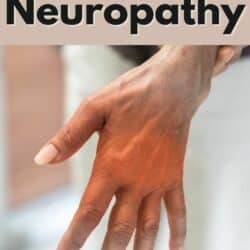Foods That Are Good For Neuropathy (& What to Avoid)
Neuropathy is a term that describes damage to the nerves outside your brain or spinal cord. In this article, I’ll explain how the foods you eat can help prevent or slow down the progression of the condition. I’ll share some diet suggestions for neuropathy, plus a list of the foods you may wish to avoid.

Explanation of Neuropathy
Peripheral neuropathy is a condition affecting more than 20 million people in the United States. This figure could be even higher, according to the National Institutes of Neurological Disorders and Stroke, as it’s believed that it may be underdiagnosed.
Neuropathy can affect multiple nerves and prevent them from sending vital messages from the brain and spinal cord to other areas of the body.
These messages may control involuntary functions like sweating, or voluntary functions like movement.
Causes of Neuropathy
Neuropathy is often a complication of diabetes, affecting around 50% of patients with the condition.
But there are lots of other things that can cause neuropathy, too, including:
- Chemotherapy medications and some drugs used to treat HIV/AIDS
- Inherited conditions (this type of neuropathy is called Charcot-Marie-Tooth disease)
- Inflammatory disorders like Hepatitis C, Lyme disease, HIV/AIDS and COVID-19
- Autoimmune diseases like lupus and rheumatoid arthritis
- Exposure to toxins, including pesticides and lead
- Kidney disease
- Excessive alcohol consumption
- Physical injury
- Nutritional or nutrient deficiencies (particularly a lack of vitamin B12)
Sometimes, though, the cause is never established, in which cases the condition is known as “idiopathic neuropathy”.
While nutritional deficiencies can clearly be addressed through a healthy diet, eating well can help in other ways, too. Not only can they help control the progression of diabetes, but the right foods can also help reduce inflammation.
Symptoms
Each nerve that makes up the peripheral nervous system has its own function.
- If your autonomic nerves are involved, you may experience digestive, bowel, or bladder problems; intolerance to heat; or changes in your blood pressure.
- If your sensory nerves are affected, you will feel changes in your skin, including burning or sharp pains, numbness or tingling in your hands or feet, or sensitivity to touch.
- If the condition is affecting your motor nerves, you may experience muscle problems like weakness, difficulty in coordinating movements, or paralysis.
So the types of symptoms you may experience with neuropathy depend on which nerves are affected.
It is possible to have more than one type of neuropathy, so you may experience a combination of these symptoms.
Diet and Neuropathy
The medical profession accepts that a nutritious diet can significantly help prevent the symptoms of neuropathy or slow down the progression of the condition.
This is because our nerves need certain nutrients in order to function correctly and regenerate after damage. What’s more, they are also vulnerable to damage from toxins.
This means that it is not just important to eat healthy foods, but also to avoid dietary toxins such as mercury.
Finally, a healthy diet and lifestyle changes can help keep your blood sugar levels in check – an important factor in managing diabetes and controlling diabetic neuropathy, a common complication.
Dietary Recommendations
There are three particular kinds of diet that can be helpful if you suffer from neuropathy. Remember – these are not “calorie-controlled” diets, so following them doesn’t mean you’ll necessarily be eating less.
Instead, these are simply patterns of healthy eating to help control your symptoms, which will help you maintain a healthy body weight too!
The Mediterranean Diet
This is based on the staple foods of people who live around the Mediterranean Sea. It contains lots of fruits, vegetables, whole grains, olive oil, legumes, nuts, and fish rich in omega-3 fatty acids. It includes very little red meat or sugary foods, and just a small amount of dairy (mainly cheese and yogurt).
As you’ll see as you continue through this article, the Mediterranean Diet contains all the nutrients you need to help control your symptoms and avoids those foods that could worsen them.
This makes it one of the best diets for neuropathy – a fact with which medical experts agree!
The Whole Food Plant-Based Diet
This eco-friendly diet focuses on plant-based foods like fruits, vegetables, and grains; largely avoids animal products; and contains very few processed or refined ingredients. The quality of food is taken into account, too, and the emphasis is on buying organic, local produce.
It is sometimes mistaken as a vegetarian or vegan diet, but since some animal products are allowed, these labels are incorrect.
There are several studies suggesting that the whole food plant-based diet could be helpful for anyone with neuropathy. Researchers have found that people who largely stick to plant-based foods have a 34% lower risk of developing diabetes than those who eat non-plant-based diets with unhealthy ingredients.
This type of diet has also been shown to help maintain healthy blood sugar levels and reduce neuropathic pain in people with diabetes.
The Low-Glycemic Diet
This is often recommended for people with diabetic neuropathy as it helps control blood sugar levels. It is based on the concept of the glycemic index (GI) – a system that rates foods depending on how they impact your blood sugar.
Foods like refined grains, for example, can cause your blood sugar to surge, so they are rated as highly glycemic. In a low-glycemic diet, you would replace them with unrefined grains (in other words, swap white bread for brown bread, or white rice for brown rice). The diet also limits sweet foods and drinks, and foods that are very high in carbohydrates.
The results of research into its effects have been promising. Experts say that strict glycemic control is the best way to prevent or slow the development of neuropathy in patients with type 1 diabetes, and to slow its progression in some patients with type 2 diabetes.
Tips for Gradual Dietary Transitions
If your diet up to now hasn’t been as healthy as you’d like, it might not be easy to switch to a new, healthier regimen.
So for the best chance of long-lasting success, you need to start gradually and allow yourself to become accustomed to regularly enjoying a range of nutritious foods.
Here are some tips to help:
- Begin by taking two unhealthy foods out of your diet and replacing them with two nutritious substitutes (eat brown pasta instead of white, for example). Continue to do this with two new foods per week.
- Try whole, nutritious foods that you’ve never eaten before and include a new one in your meals each week.
- Check the labels of foods you eat regularly and look for healthier options with minimal processing (peanut butter, for example, containing just nuts and no added sugar).
- Swap sugary sodas for fruit-infused water.
- Plan meals in advance and prepare more foods at home – it can be hard to make healthy choices when eating at a restaurant.
- Remove unhealthy snacks from the kitchen and replace them with healthy alternatives.
But be sure to speak to your healthcare provider before making any drastic dietary changes – we all have different needs, so not all of the recommendations shown here may be suitable for you.
Key Dietary Elements for Neuropathy Management
Here are the main nutrients to focus on when putting together the best diet for neuropathy:
Vitamins and Minerals
These play an important role in any diet and are key to overall good health. Certain vitamins are particularly useful for reducing the severity of neuropathy symptoms.
These include:
- Vitamin B1 – A deficiency of B1 (also known as thiamine) may potentially lead to cranial neuropathy
- Vitamin B6 – This supports the function of the nervous system
- Vitamin B12 – Many cases of neuropathy are associated with a deficiency in this vitamin
Also important are antioxidants which are believed to help prevent inflammation and prevent or heal nerve damage.
Brightly colored fruits and vegetables tend to be rich antioxidant sources, especially berries and grapes which contain a powerful compound called resveratrol. Vegetables are particularly good sources of alpha-lipoic acid, an antioxidant that can improve nerve function and lower blood sugar levels.
Finally, be sure to consume foods containing the minerals magnesium and calcium. Some studies have suggested that both may be helpful in relieving chemotherapy-related neuropathy, while magnesium is also believed to help reduce inflammation.
Omega-3 Fatty Acids
Found in fatty fish, flaxseeds, and walnuts, omega-3 fatty acids have been shown in multiple studies to help reduce inflammation.
Low-Glycemic Index Foods
Foods low on the glycemic index help keep blood sugar levels under control and are particularly important in managing diabetic neuropathy.
Good examples include:
- Most fruits
- Green vegetables
- Legumes like chickpeas and lentils
- Raw carrots
- Barley
- Plain yogurt
- Ricotta cheese
Specific Foods to Include
1. Whole Grains
Whole grains are good sources of the B vitamins needed for nerve health. They are called “whole” grains because all three parts of the kernel are intact – the bran, germ, and endosperm. These are packed with nutrients.
In contrast, refined grains (like white rice) contain only the endosperm, so they won’t provide the nutrients you need.
Useful whole grains to try include:
- Oatmeal
- Brown rice
- Buckwheat
- Quinoa (technically a seed but treated as a grain)
- Foods like whole wheat bread and whole grain pasta (avoid if you have a gluten sensitivity or celiac disease)
2. Lean Proteins
Lean plant-based proteins like lima beans, black beans, chickpeas, pinto beans, and lentils are good sources of magnesium. Lean meat products like chicken and turkey, meanwhile, are rich in vitamin B12, which is key to a healthy nervous system.
Other protein sources to include in the best diet for neuropathy are:
- Lean meats
- Tofu
- Tempeh
- Eggs
- Milk
- Greek yogurt
3. Fatty Fish (Rich in Omega-3s)
Here are some good examples of fatty fish to include in your diet.
- Salmon
- Sardines
- Herrings
- Mackerel
- Tuna
- Trout
If you don’t eat fish, you can also get omega-3 fatty acids from chia seeds and flaxseeds.
4. Nuts and Seeds
Nuts and seeds are packed with B vitamins, making them ideal for helping control neuropathy symptoms. Many are rich in fiber, too, which helps you feel full for longer and can stop you from reaching for unhealthy snacks between meals!
Good examples include:
- Walnuts
- Cashews
- Almonds
- Chia seeds
- Flaxseeds
- Sunflower seeds
5. Fruits and Vegetables
Most fruits and vegetables are rich in vitamins and minerals, but for the best diet for neuropathy be sure to include those that are particularly high in antioxidants.
These are typically very brightly colored and include:
- Berries
- Grapes
- Oranges
- Avocados (also great for helping you absorb antioxidants more easily)
- Broccoli
- Brussels Sprouts
- Kale
- Spinach
- Potatoes
- Asparagus
- Sweet potatoes
Potatoes, spinach, broccoli, and kale are particularly good sources of alpha-lipoic acid, while broccoli, spinach, and asparagus are also rich in B vitamins.
6. Dairy and Alternatives
Dairy foods and dairy products like Greek yogurt, cottage cheese, and milk, are all good protein and calcium sources, plus they’re rich in vitamin B12, too.
Alternatively, try soy milk, coconut milk, almond milk, or other plant-based varieties if you are on a dairy-free diet.
7. Healthy Oils
Be sure to use healthy oils when cooking your meals, or for preparing salad dressings. Olive oil is a great choice – just one tablespoon contains around 13% of your daily recommended intake of vitamin E. This helps protect the myelin – a fatty sheath – around your nerves and allows electrical impulses to travel more quickly.
Another good option is avocado oil – it’s rich in compounds that help prevent inflammation and also help your body better absorb other nutrients. Indeed, researchers found that adding avocado oil to a salad significantly improved the absorption of healthy carotenoids from that meal!
Or try flaxseed oil – a rich source of omega-3 fatty acids shown to help nerves heal more quickly after injury. Flax oil is best used raw (not for cooking).
8. Herbs and Spices
They don’t just add rich flavor to foods – some herbs and spices pack quite a punch in terms of nutrition, too!
The ones that can help reduce nerve pain and neuropathy are:
- Turmeric – a powerful antioxidant with anti-inflammatory properties
- Ginger – shown to relieve neuropathic pain by suppressing inflammation
- Cinnamon – found by experts to be useful in managing diabetic neuropathy (be sure to use “Ceylon” or “true” cinnamon)
- Garlic – long revered for its heart-healthy benefits and now becoming recognized for its role in supporting the nervous system
9. Beverages
Sugary sodas can make the symptoms of neuropathy worse – so what should you drink instead? The most obvious option is water, perhaps infused with fresh fruit if you prefer not to drink it plain.
Another great alternative is green tea! Rich in antioxidants, it has also been found to have anti-neuroinflammatory effects, making it ideal if you suffer from neuropathy. If you’re not keen on the flavor, try adding a squeeze of lemon juice to give a nice pop of citrus.
Cinnamon and ginger work well, too, plus they bring their own symptom-relieving benefits. Another herbal tea I’d recommend is chamomile. Proven to lower blood sugar levels in people with diabetes, it also contains a natural antioxidant called apigenin, which can help reduce inflammation.
Foods to Avoid or Limit
As you can see, the best diet for neuropathy contains a wide variety of foods, making it very easy to follow.
But there are a few foods that you should avoid or only consume in moderation, as they are believed to worsen symptoms.
High-Sugar Foods and Drinks
Consuming sweetened foods and beverages can make it very difficult to control your blood sugar. What’s more, too much sugar is associated with increased inflammation throughout the body – something you want to avoid with neuropathy.
Filling up on sugary foods and drinks may also prevent you from consuming the healthy foods you need, potentially worsening the nutritional deficiencies that lead to neuropathic pain.
Alcohol
There is a strong connection between alcohol and neuropathy – indeed, consuming too much is known to be a cause of the condition. This is believed to be partly because alcohol damages the nerves.
But it may also be because those who regularly drink in excessive amounts tend to have a poor diet, resulting in deficiencies in important nutrients.
Processed and Fried Foods
Many processed and fried foods are made from refined grains and may be high in sugar and/or unhealthy fats. These can have an adverse effect on your blood sugar levels and are known to cause inflammation.
Avoid refined grains, such as white bread and white rice, since they can trigger peripheral neuropathy symptoms.
Some Fish
Most types of fish and shellfish contain small amounts of mercury, which is a toxin linked to neuropathy. However, these trace amounts are usually so small that they are negligible in terms of health, and the benefits of these fish outweigh any risks.
It’s a different story, though, for large, deep-ocean fish like king mackerel, shark, marlin, swordfish, and tilefish. Because they prey on smaller fish, their mercury levels are much higher, and eating them may worsen your symptoms.
The Importance of Hydration
Keeping your body well-hydrated helps prevent toxins from accumulating and is believed to help control inflammation, although there is little research to confirm this. It is also important that there is sufficient water in your neural pathways for your nerves to send and receive signals efficiently.
Dehydration can disrupt these signals, potentially resulting in uncomfortable sensations or pain.
Don’t rely on thirst alone to tell you when it’s time for a drink – feeling thirsty is usually a sign that you are already dehydrated. Instead, make a point of stopping for a drink of water frequently throughout the day. Using a water bottle with time markings can help with this.
And, remember that other types of liquids including coffee and alcohol are not great for hydration (and are, in fact, dehydrating to the body). So always prioritize water when you are looking to hydrate.
Supplements and Neuropathy
If you are struggling to meet your nutritional requirements through diet alone, your healthcare provider may suggest taking supplements.
Some of those commonly recommended for people with peripheral neuropathy are:
- Alpha-lipoic acid – This is an antioxidant with anti-inflammatory effects. It has also been shown to reduce blood sugar levels.
- Vitamin D – This has been shown to help reduce neuropathic pain, but many people don’t get enough.
- Vitamin B1 – People with diabetes are often deficient in this vitamin (also known as thiamine).
- Vitamins B6 and B12 – A deficiency in these vitamins is a potential risk factor for developing peripheral neuropathy.
- Vitamin E – This may help prevent chemotherapy-induced peripheral neuropathy and may help manage symptoms in patients with diabetic neuropathy.
- Omega-3 fatty acids – These have anti-inflammatory properties and may keep the myelin sheath that protects the nerve healthy.
- Acetyl-L-carnitine – This may help reduce pain.
However, it is very important to speak to a medical professional before taking any of these supplements, as they may not be suitable for you.
Alpha-lipoic acid, for example, can be harmful if you have a vitamin B1 deficiency, or are a heavy alcohol user.
Vitamin B6, meanwhile, can actually trigger neuropathy if you have too much, so your dosage should be monitored by your healthcare provider.
Acetyl-L-carnitine can be problematic, too, and is not recommended if you take blood-thinning medications, or have hypothyroidism or a history of seizures.
Don’t Miss These Helpful Diet Resources!
Conclusions
Multiple studies have shown that nutrition plays a big role in neuropathy, both in the way certain deficiencies can trigger the condition and in the way certain foods can relieve its symptoms. The best diet for neuropathy is one that’s rich in clean and wholesome ingredients. Not only will these help ease painful symptoms, but they’re great for supporting your overall good health, too!
Don’t forget to join my newsletter list to get exclusive clean eating recipes and tips. The newsletter is 100% free with no spam; unsubscribe anytime.
About the Author: Carrie Forrest has a master’s degree in public health with a specialty in nutrition and is a certified holistic nutritionist. She is a top wellness and food blogger with over 5 million annual visitors to her site. Carrie has an incredible story of recovery from chronic illness and is passionate about helping other women transform their health. Send her a message through her contact form.
Note: this post is for informational purposes only and is not intended as medical advice. Please consult your healthcare provider for recommendations related to your individual situation.





















I want to thank you for all the recipes and health information. You have been so helpful.
Awwww you are so kind, you’re welcome! 🙂